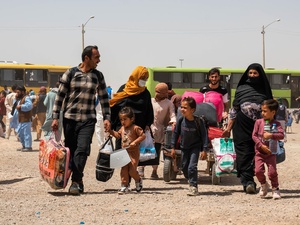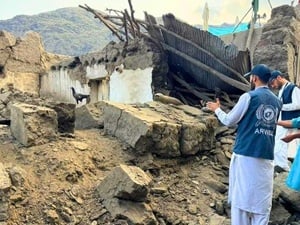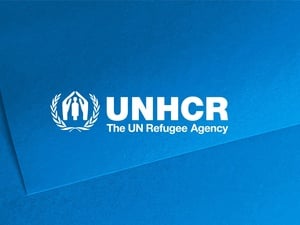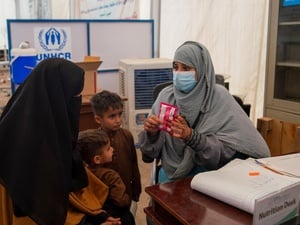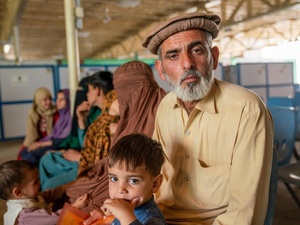Afghanistan Humanitarian Update No. 29
Afghanistan Humanitarian Update No. 29
At a Glance:
- Assistance to new arrivals stalled on southern Pakistan border
- UNHCR boosts medical capacity in border hospitals
- Work continues on proposed refugee sites in North-West Frontier Province
- Unconfirmed reports of 3,000 Afghans camping close to Iranian border
Assistance to new arrivals stalled in Baluchistan
As of early Monday, there were around 80 families (perhaps 400 individuals) waiting outside the perimeter of the Killi Faizo staging camp close to the Afghan border in Pakistan's southern province of Baluchistan. The camp - originally intended as somewhere to house people for a few nights before moving them to one of the better-placed sites nearby - is full and no new vulnerable Afghans have been able to enter since November 1.
Negotiations between UNHCR and the authorities about moving the Killi Faizo residents (or future vulnerable Afghans) to Roghani - a better site with much greater capacity some 20 kilometres south of the border town of Chaman - have yet to bear fruit. As a result, the situation is essentially stalled, with 2,245 individuals inside Killi Fiazo receiving a full aid package from UNHCR, WFP and other agencies, and those outside receiving next to nothing.
With night-time temperatures dropping dramatically over the past few days, UNHCR is deeply concerned about the condition of these families living out in the open, and is currently discussing how to improve their situation with the local authorities. UNHCR staff at Chaman were planning Monday to give out blankets and high-protein biscuits provided by WFP to all those waiting outside the Killi Faizo site. They are also receiving water from inside Killi Faizo, and local benefactors are providing them with bread and some other food items on a daily basis.
UNHCR boosts medical capacity in border hospital
Work is continuing on finding ways to assist Afghans who have already crossed into Baluchistan and melted away into the old refugee camps in the area, or into Quetta city. Some particularly destitute families - or ones with special problems - have already been given direct financial assistance by UNHCR - while discussions continue with the local authorities, UNICEF, Mercy Corps International and Save the Children (US) about ways to extend other assistance to new arrivals, especially in the fields of health and education. UNHCR has already begun direct support to the front-line hospital in Chaman, close to the border, providing 1.2 MT of drugs donated by the Jordanian Hashemite Charity Organization and a UNFPA emergency obstetrics kit. The Chaman hospital is currently poorly equipped to deal with the types of cases starting to appear at the border: the operating theatre, laboratory, emergency ward, pharmaceutical management, blood bank and delivery room are all currently non-functional. In addition there are no female nurses or medical staff at all.
On the plus side, in addition to the UNHCR donations, there are now some 10,000 measles vaccine doses in stock, and MSF continues to vaccinate newly arrived children. MSF (Holland), with assistance from UNHCR, has begun establishing a community health workers system with the purpose of detecting and referring patients quickly, treating mild cases of dehydration, systematic following up on malnourished children, checking measles vaccination coverage, identifying pregnant women and instituting hygiene promotion programmes.
Around 11 cases of severe malnutrition were identified by medical workers at the Chaman border last week, along with many other severe medical cases including acute respiratory infections and dysentery. The malnutrition cases in particular have raised alarm that the food crisis may have turned a corner inside Afghanistan, since according to UNHCR's Health Coordinator in Quetta, severe malnutrition is a very late indicator of lack of food availability and accessibility.
Sites in North-West Frontier Province
UNHCR is drawing up a plan with the local authorities in Pakistan's North-West Frontier Province (NWFP) to relocate newly arrived refugees living in in over-crowded and destitute conditions in Jalozai camp, as well as other camps and urban areas, to new camps that have been identified in the so-called Tribal Agencies close to the Afghan border. Of the fifteen agreed sites in NWFP, work is currently under way in eight (site development has been bedevilled by numerous problems - in particular, recently, by land ownership disputes). The first one to be used is likely to be Kotkai in Bajaur agency, north of Peshawar. The immediate focus will be to move people from Jalozai. Relocation to new sites - set to start around 11 November - will be voluntary and priority will be given to the most destitute.
Last Thursday, around 4,100 Afghans are believed to have arrived via various NWFP border crossing points, with another 4,500 on Friday - although it is not clear what percentage of these could be called genuine new arrivals. Similar numbers had been reported earlier in the week. A survey in NWFP that was concluded on 25 October, estimated that at least 65,000 new arrivals had come from Afghanistan since 11 September. In all, UNHCR believes well over 100,000 Afghans have entered Pakistan since September 11.
3,000 Afghans reported near Iranian border
UNHCR has received unconfirmed reports from the Iranian Red Crescent Society (IRCS) and an NGO, that a group of some 3,000 Afghans are living out in the open near the Makaki camp on the Afghan side of the border in Nimroz province. When they arrived at Makaki, they were given some food and other assistance, but were not admitted to the camp since it is already full with between 4,500 and 6,000. They are reportedly now camping out in the open close to Makaki. The Makaki camp, which is in Taliban-held territory, is run by the ICRS, along with another camp, known as Mile-46, which is inside a small pocket of Nimroz controlled by forces affiliated with the United Front or Northern Alliance.


